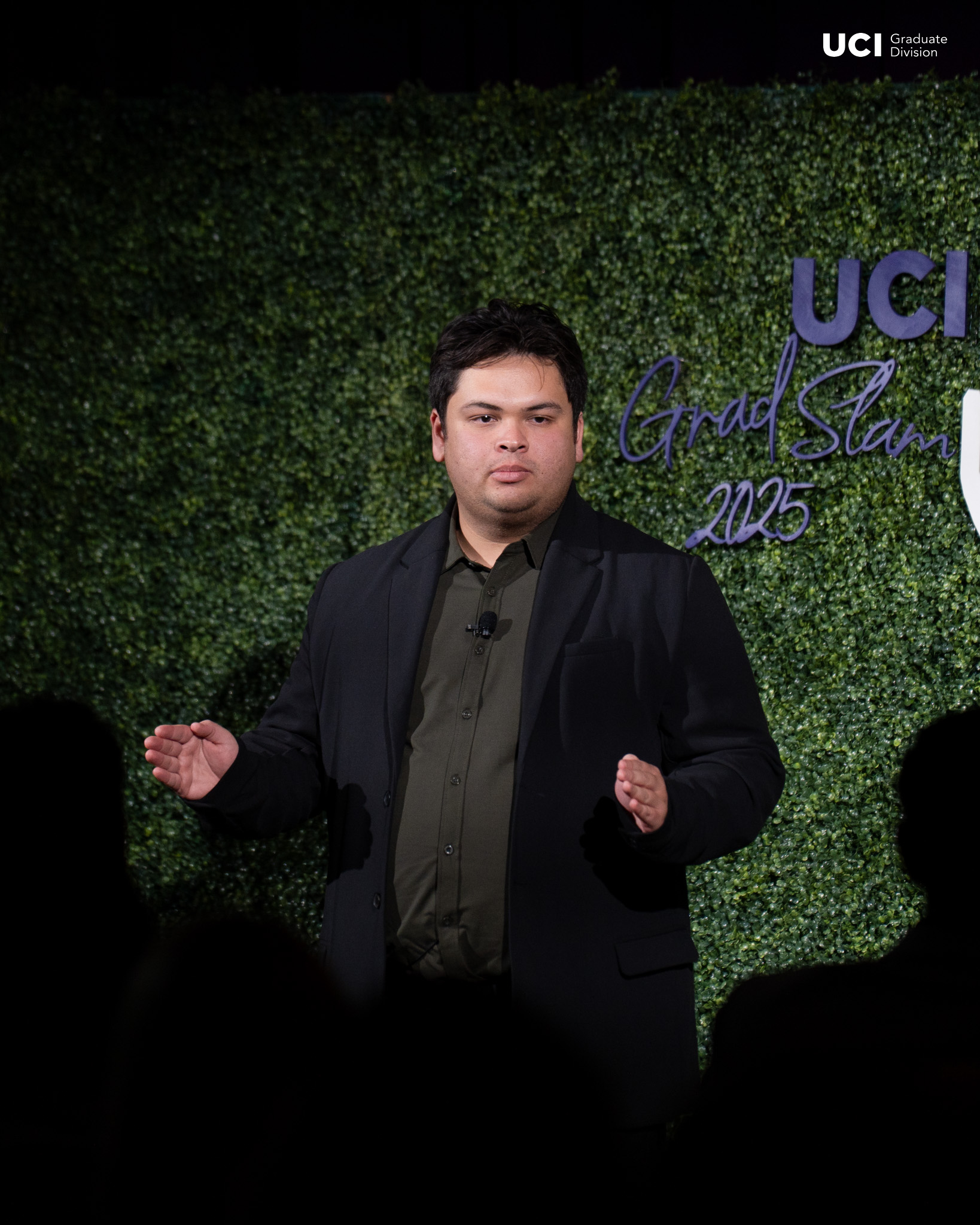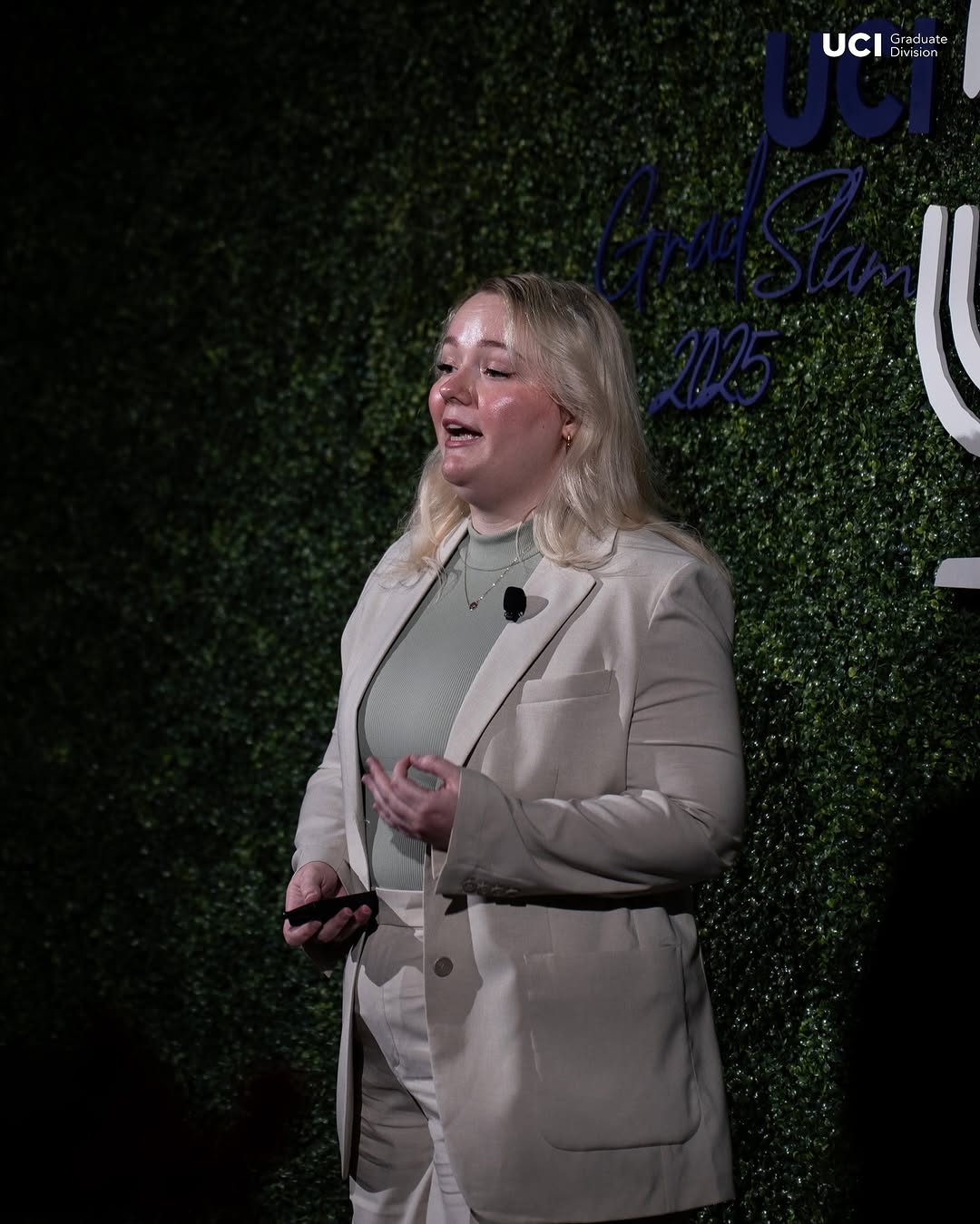Neuroscience Graduate Students Shine at UCI Grad Slam, Taking First and Second Place

The UC Irvine Center for the Neurobiology of Learning and Memory (CNLM) is proud to celebrate two of its outstanding graduate students, Casey Vanderlip and Sydney Prange, both in the Charlie Dunlop School of Biological Sciences who placed first and second, respectively, in the 2025 UC Irvine Grad Slam competition. This annual competition challenges graduate students to present their research in just three minutes, using clear and engaging language that is accessible to a general audience. Grad Slam highlights the critical role of science communication in bridging the gap between research and society.
This year’s sweep by neuroscience students marks the second year in a row that a neuroscientist has taken home the top prize. In 2024, Onwodi Ifejeokwu, a neuroscience PhD student, won first place for her compelling talk titled "Kill the Cancer; Spare the Brain!" which highlighted innovative strategies to treat brain cancer without harming healthy brain tissue. The continued success of neuroscience students in this high-profile competition is a testament to their strong training in science communication and public engagement.
Communicating Neuroscience to a Broad Audience
Both Casey and Sydney delivered compelling presentations that captivated the Grad Slam judges and audience. Casey, an MD/PhD student in Dr. Craig Stark’s lab, shared about his lab’s work on developing an accessible cognitive test that detects Alzheimer’s disease before clinical symptoms appear. Current diagnostic tools for Alzheimer’s disease, such as brain scans and spinal taps, are expensive and invasive, making early detection a significant challenge. Casey’s research focuses on a simple memory test that taxes the brain regions affected early in AD, potentially identifying at-risk individuals years in advance.
Reflecting on his experience, Casey emphasized the power of effective science communication:
“This was an incredible opportunity to bridge the gap between my research and public understanding. Science isn’t just about discovery, it’s also about making knowledge accessible and meaningful. Participating in Grad Slam reinforced the importance of clear, engaging communication, and I’ve learned that distilling complex ideas into compelling narratives isn’t just a skill, but a responsibility. If we want to make an impact, whether it’s in Alzheimer’s research or any field, we have to ensure our work reaches the people who need it most.”
Sydney Prange, a PhD candidate in Dr. Katherine Thompson-Peer’s lab, delivered a talk focused on neurodegeneration and dendrite regeneration. Dendrites are the branch-like extensions of neurons that act as the cell’s antennas, receiving signals from other neurons and transmitting them to the cell body. They play a critical role in brain function, allowing neurons to communicate and form the intricate networks that support memory, movement, and cognition.
In diseases like Parkinson’s, Alzheimer’s, and Huntington’s, neurons gradually lose their dendrites, disrupting these communication pathways and leading to cognitive decline and motor impairment. Sydney’s research explores a surprising finding: when a single dendrite is injured, the remaining dendrites can respond protectively—sometimes even regenerating to compensate for the loss. This discovery suggests a potential new pathway for treating neurodegenerative diseases by harnessing the brain’s natural ability to repair itself.
Sydney’s commitment to science communication is evident in both her research and public engagement: “Participating in Grad Slam was an important experience for me because I am passionate about communicating science to the broader public. I think that now more than ever we have a responsibility as scientists to explain what we do in a way that anyone can understand so they recognize the value of public funding for scientific research. Without public support, much of our work wouldn’t be possible, and creative solutions to pressing scientific problems would be hindered.”

The Importance of Science Communication in Neuroscience
Sydney’s advisor, Dr. Katherine Thompson-Peer, praised her ability to connect with an audience. “Sydney has given numerous talks over her graduate career to diverse audiences, and she consistently demonstrates an exceptional ability to distill her message to its core components. Her success in Grad Slam reflects years of refining how she describes her project, carefully crafting the phrasing and imagery that most clearly convey the impact of her work. She incorporates humor and body language in a way that makes her talk both engaging and memorable.”
Dr. Thompson-Peer also emphasized the broader significance of science communication: “Most of our discovery research is funded by public tax dollars, and it is our responsibility to share those findings in a way that everyone can understand. Giving a great talk isn’t just about explaining data—it’s about conveying curiosity, excitement, and the broader impact of our work. When done well, science communication fosters connection, making research more accessible and meaningful.”
Casey’s advisor, Dr. Craig Stark, echoed this sentiment, emphasizing why effective communication is essential to scientific progress. “Locked inside a single scientist’s head, a single lab, or within the confines of purely academic research, science isn’t living up to its true potential. Science, the ideas we’re working on, and the discoveries we’re making need to get out, stretch their legs, and interact with other ideas—ideas that can come from other scientists or from the public. Being an effective communicator gives your ideas and discoveries the chance to live up to their true potential and to shape the world. Without that, they remain locked inside your head, your lab, or your field.”
Looking Ahead
As Casey prepares for the UC-wide Grad Slam competition, he is refining his presentation to make it even more impactful. “I’m focusing on making my message clearer, my delivery stronger, and my story more compelling. I want to ensure that anyone, regardless of their background, understands why early Alzheimer’s detection matters.”
For Sydney, the competition marks an exciting milestone as she prepares to defend her dissertation in May 2025. Looking ahead, she hopes to continue advocating for science communication and funding: “After receiving my PhD, I plan to work in a role where I can help secure or distribute funding for scientific research, whether at a university, nonprofit, or another organization. I want to support the research that drives discovery and innovation.”
A Proud Moment for UCI Neuroscience
The success of Casey and Sydney at Grad Slam exemplifies the excellence of UC Irvine’s neuroscience graduate community and the power of effective science communication. By making their research accessible and engaging, they are not only advancing scientific understanding but also ensuring that the broader public recognizes the significance of their work. The CNLM celebrates their achievements and looks forward to following their continued impact in the field of neuroscience and beyond.
